Account by Maj William Sochon on operation Semut III - Part 2
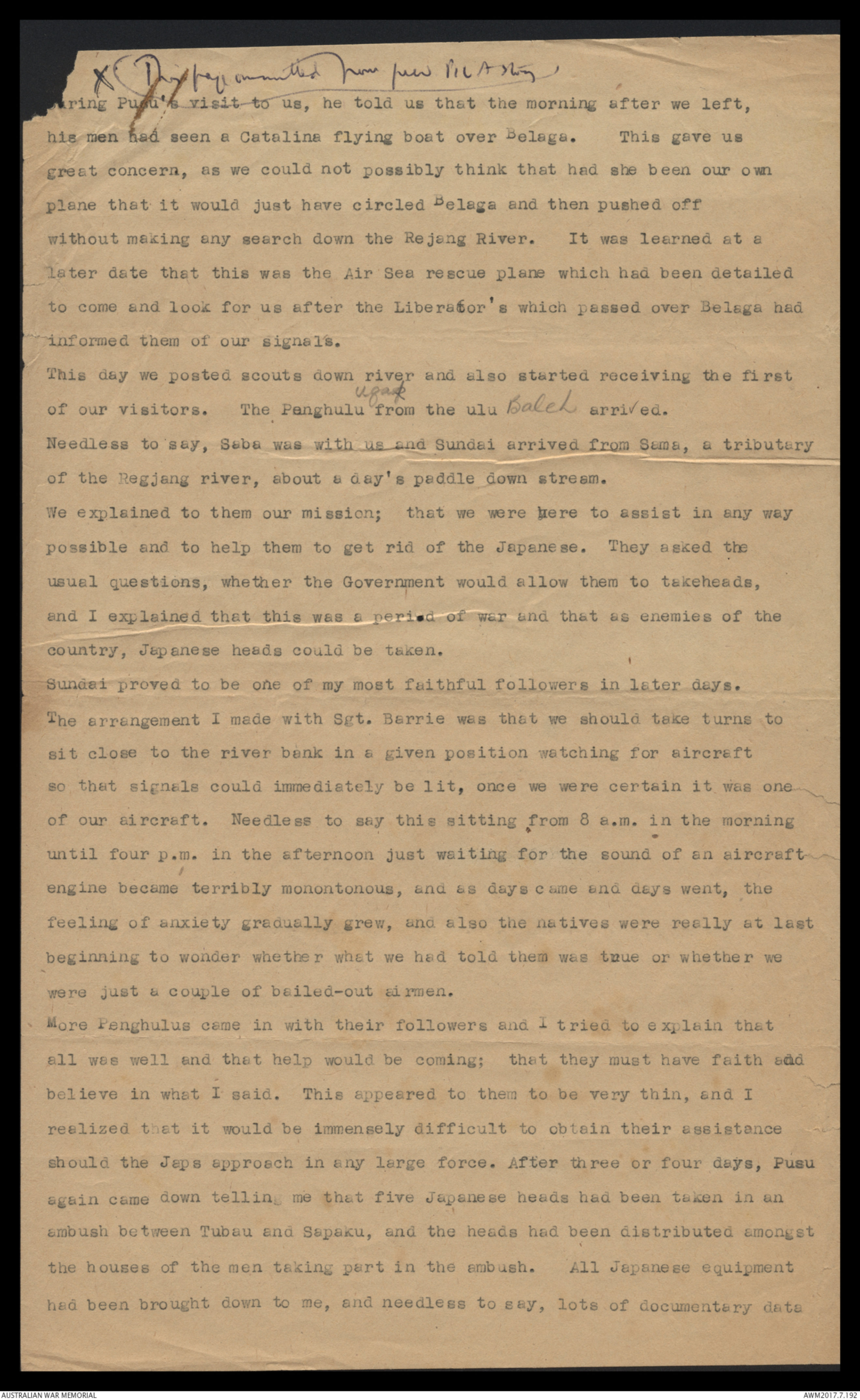
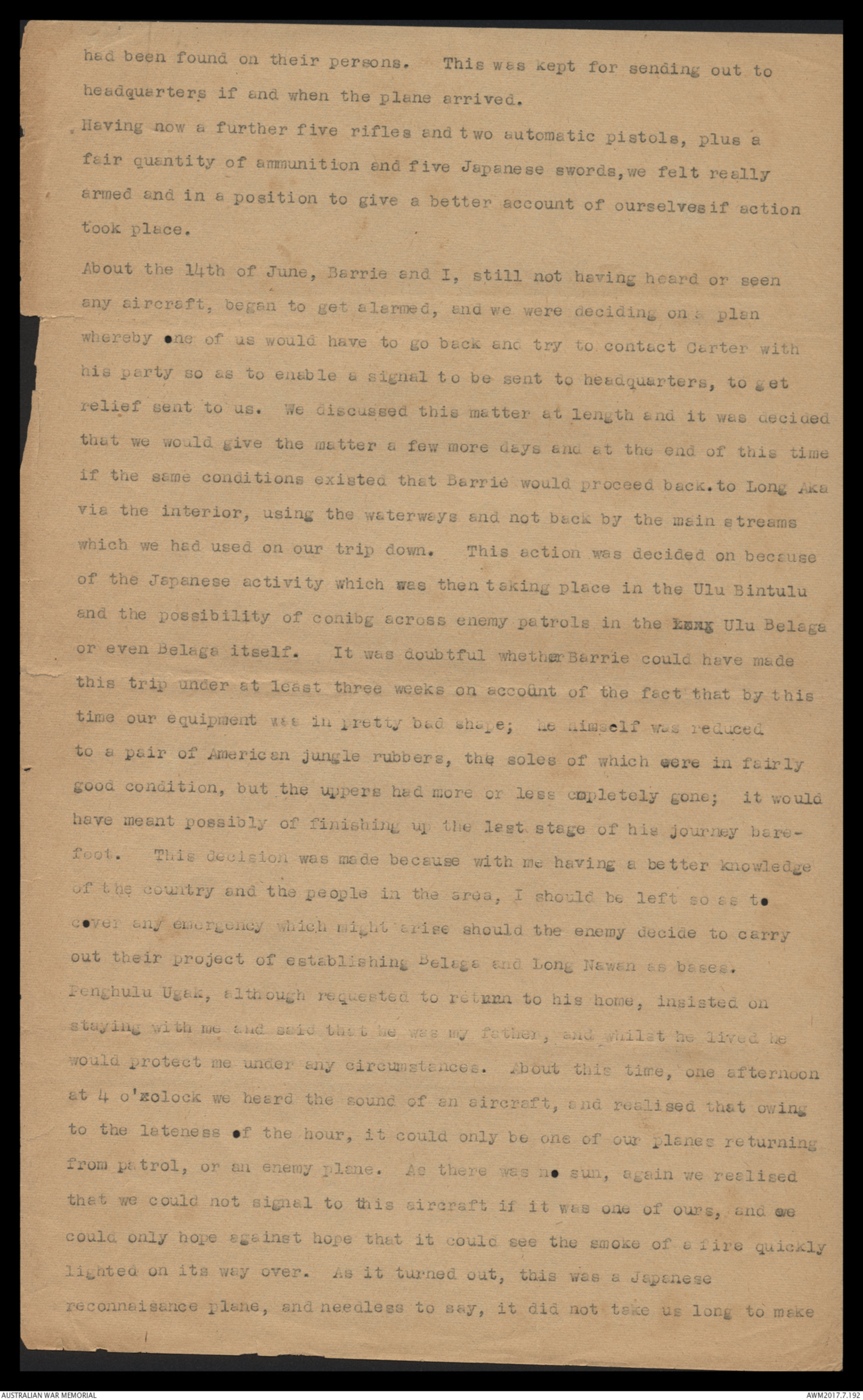
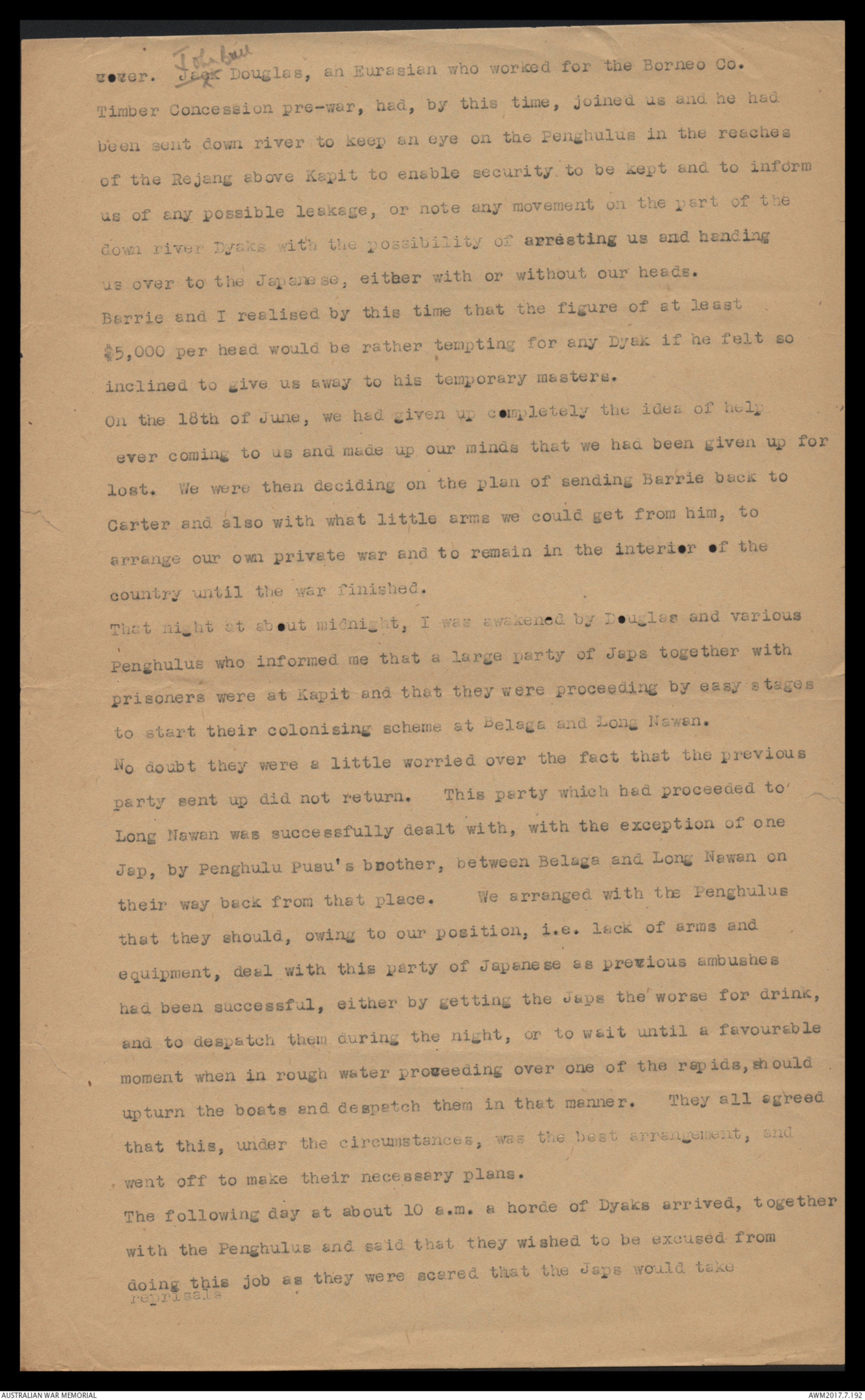
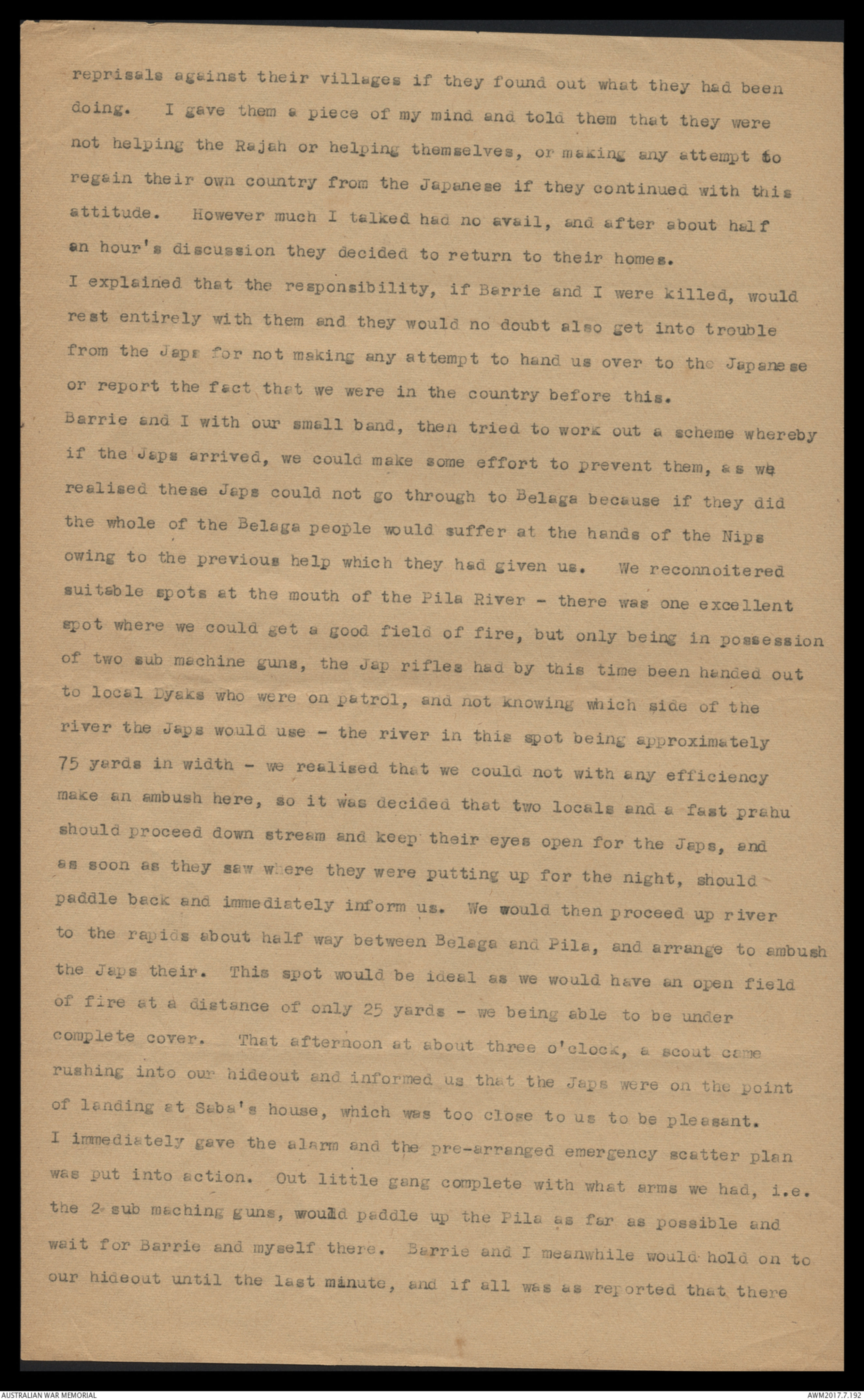
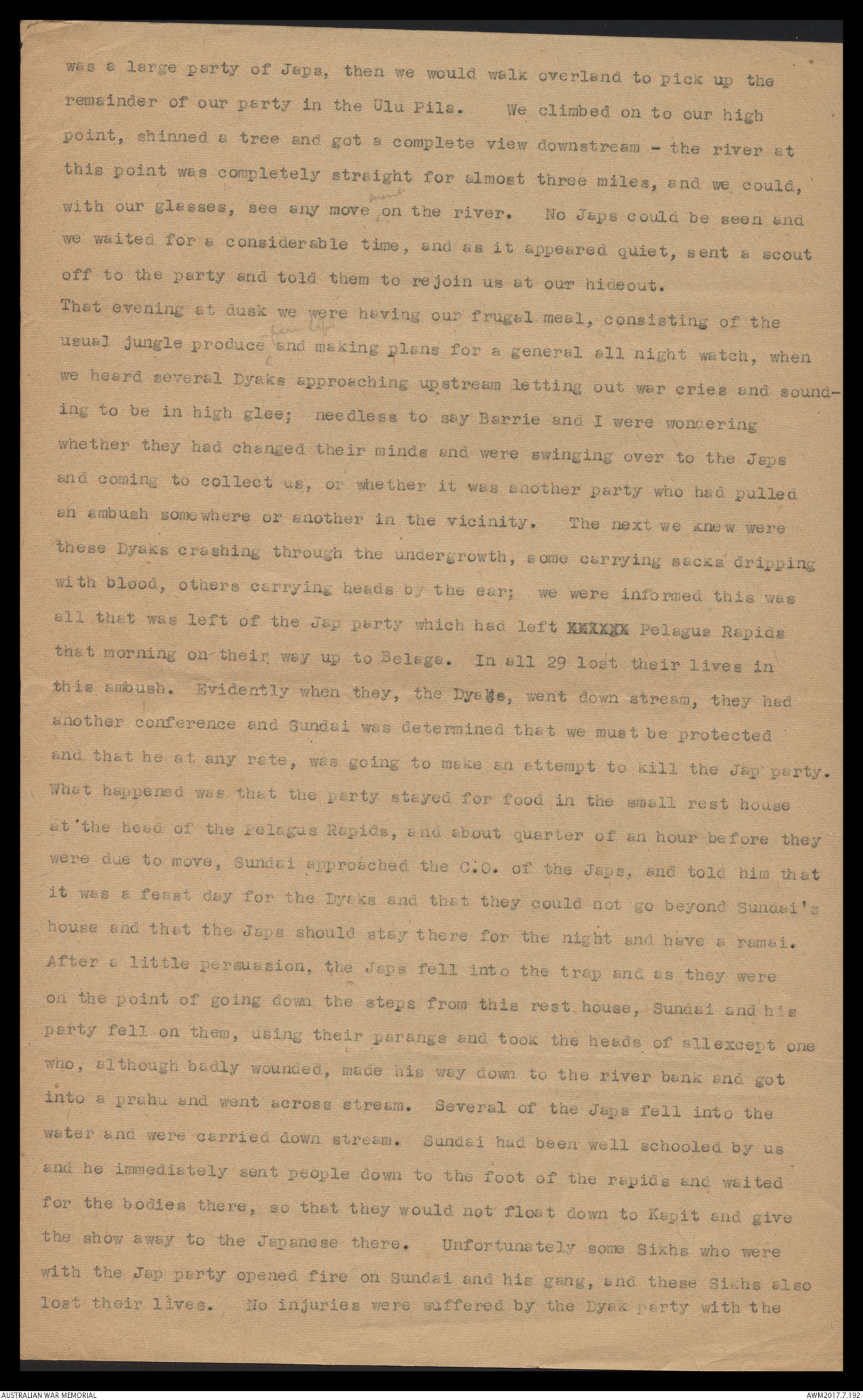

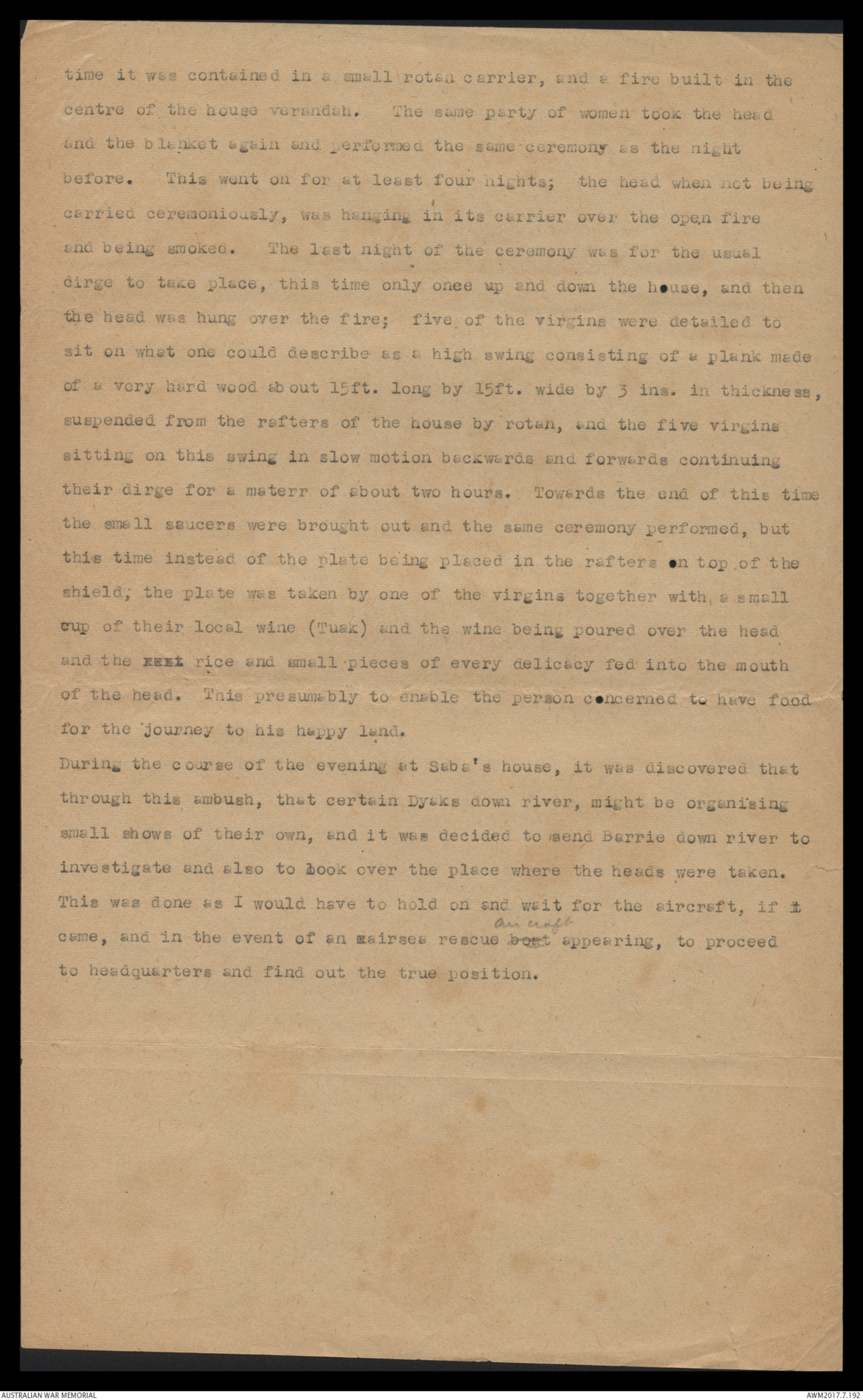
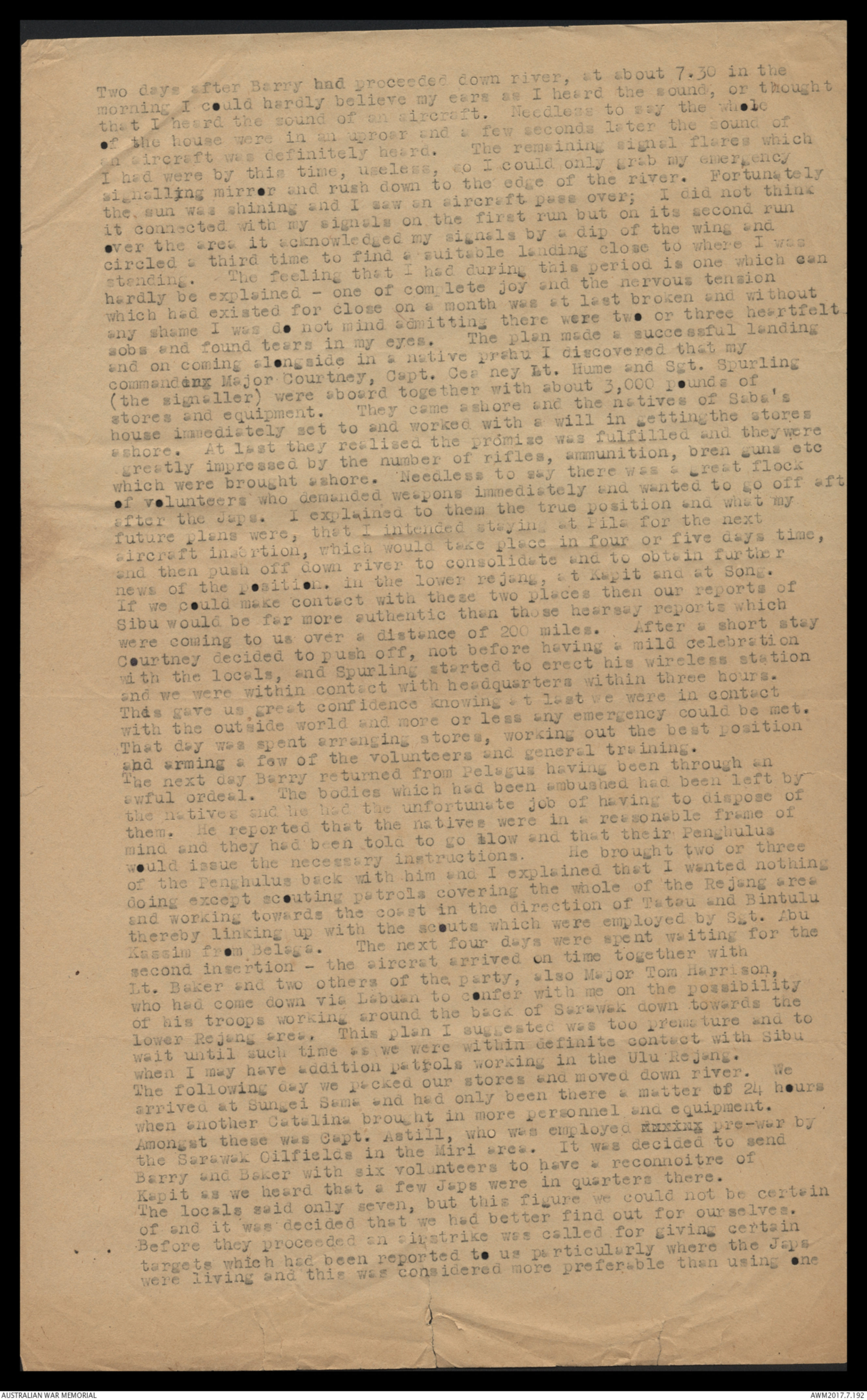
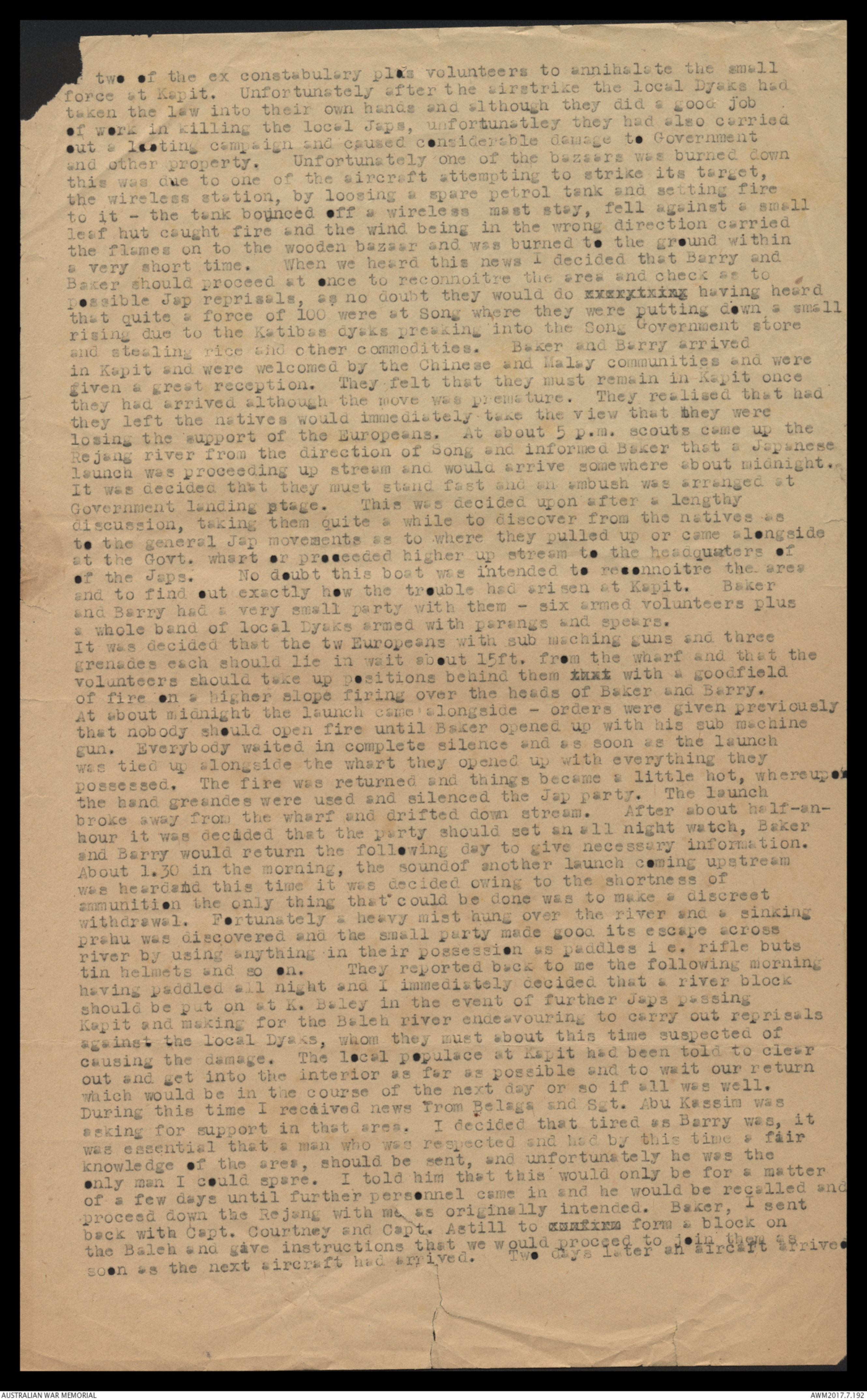
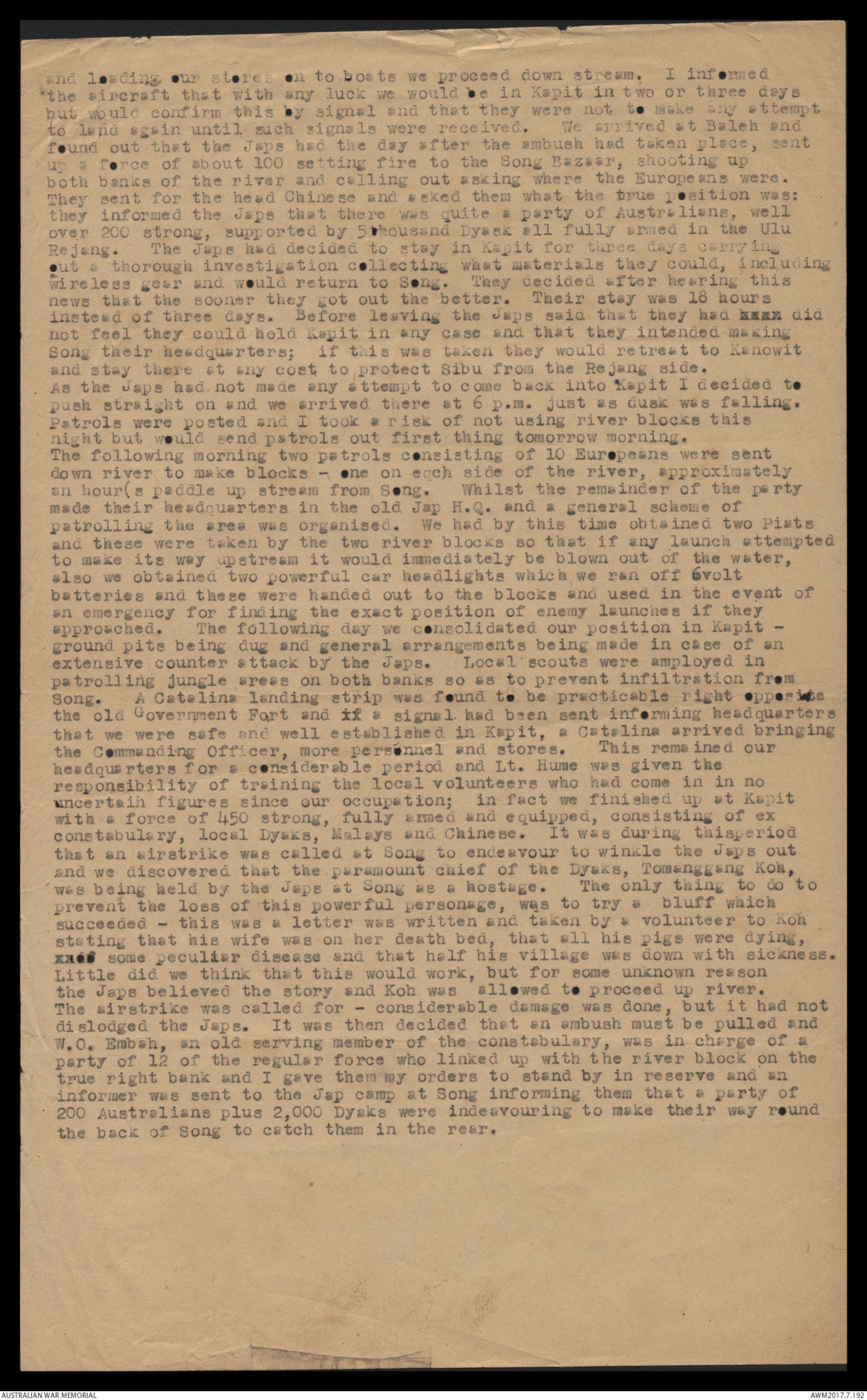
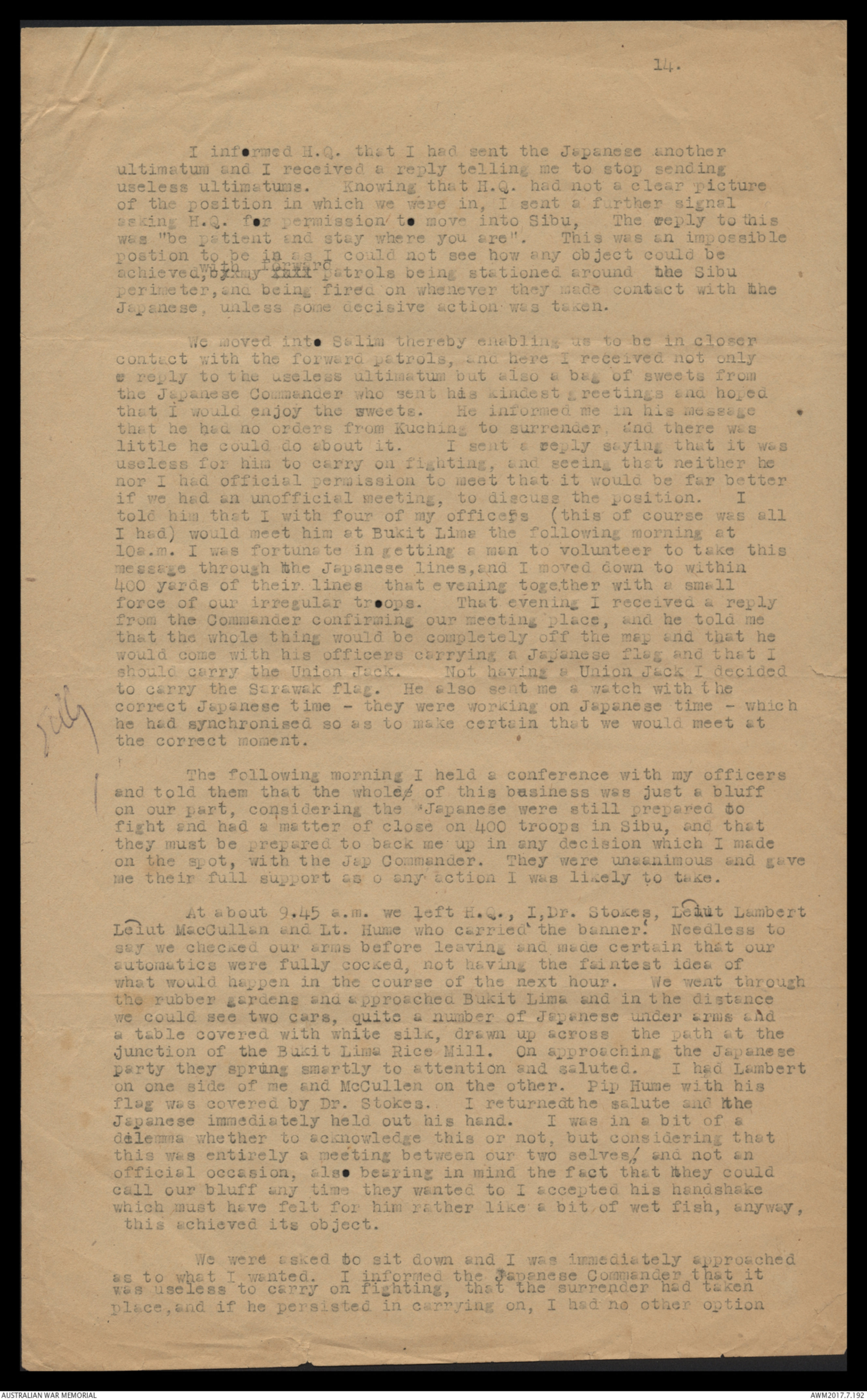
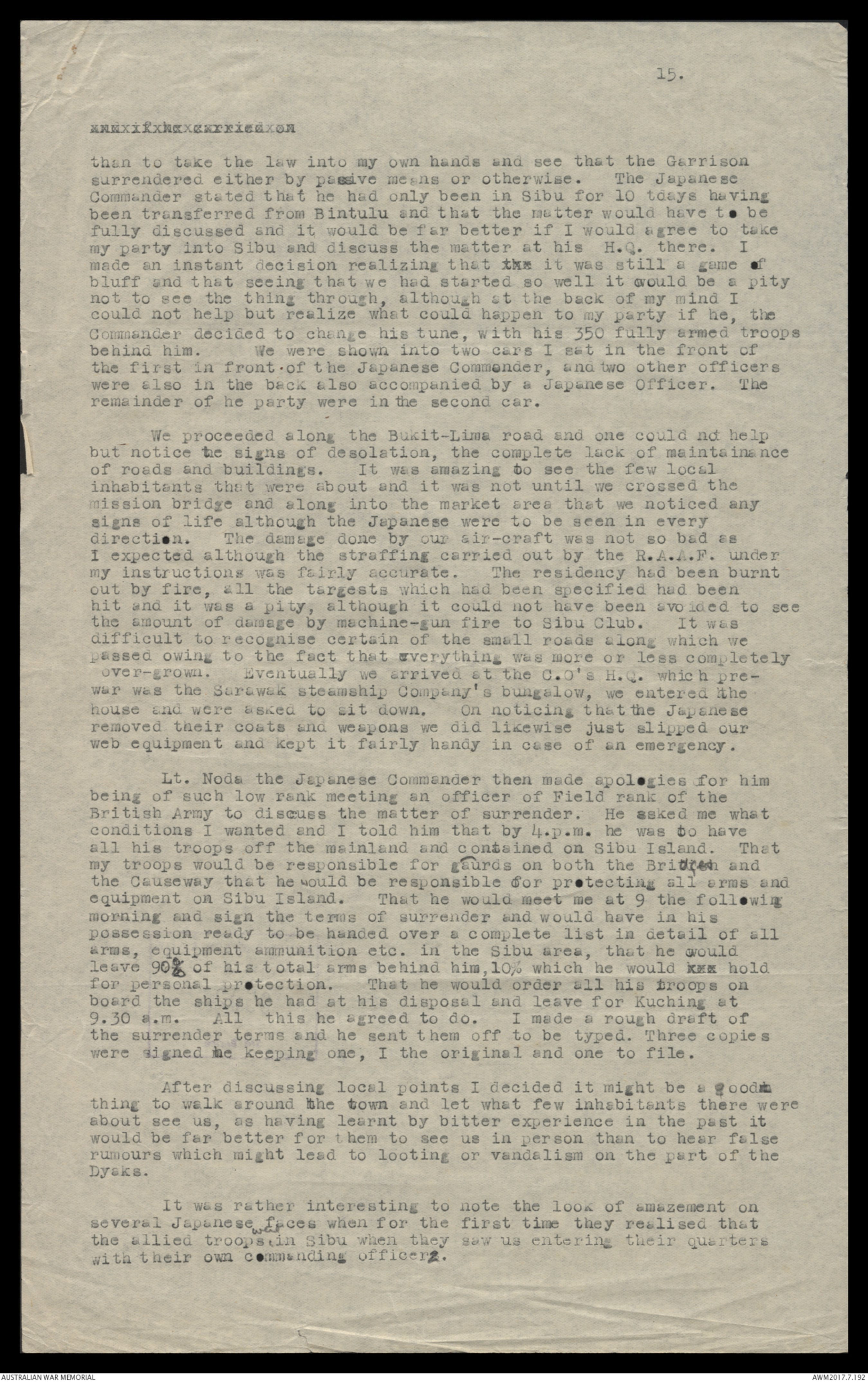
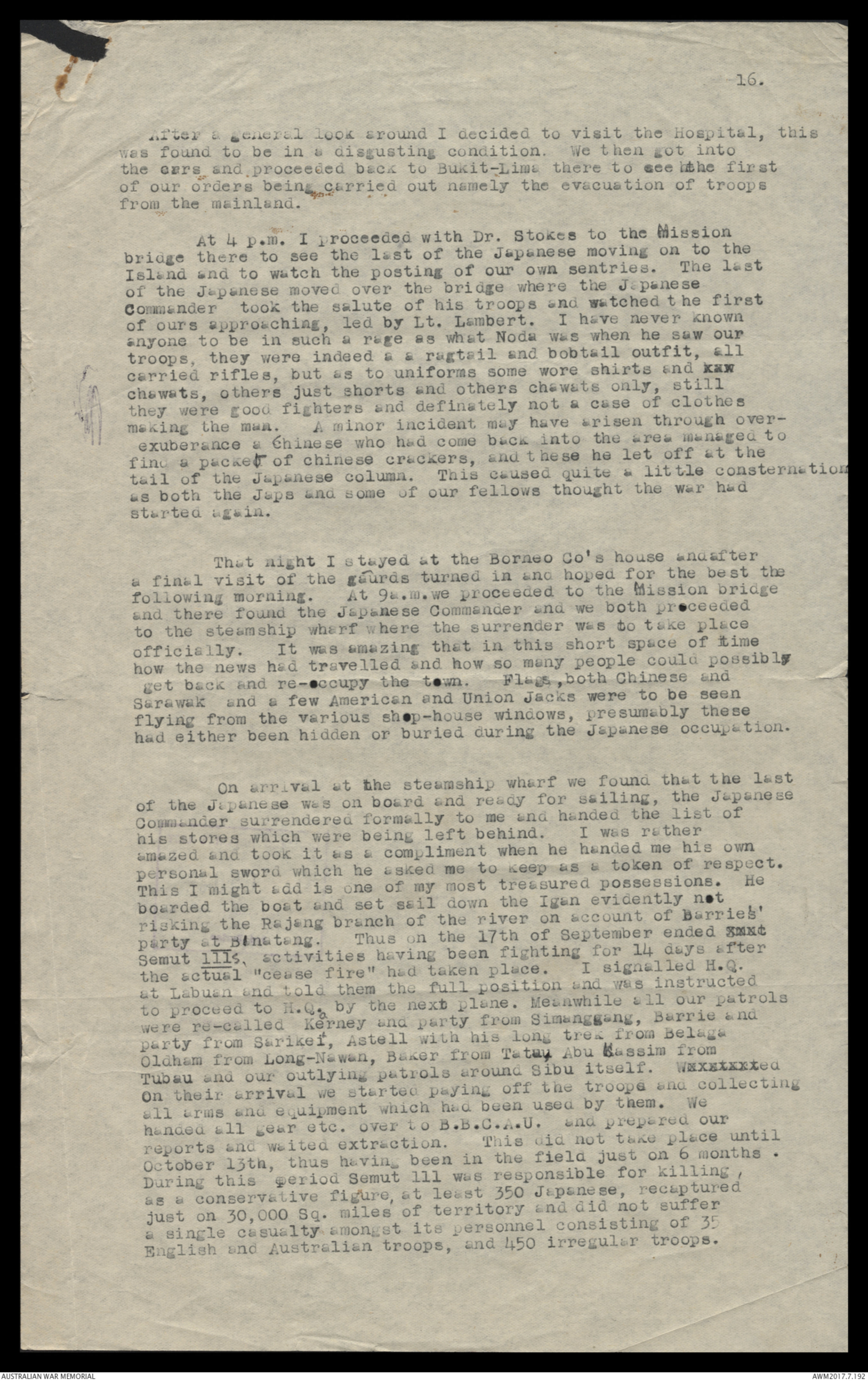
X This page committed him pen PILA story]
During Pusu's visit to us, he told us that the morning after we left,
his men had seen a Catalina flying boat over Belaga. This gave us
great concern, as we could not possibly think that had she been our own
plane that it would just have circled Belaga and then pushed off
without making any search down the Rejang River. It was learned at a
later date that this was the Air Sea rescue plane which had been detailed
to come and look for us after the Liberator's which passed over Belaga had
informed them of our signals.
This day we posted scouts down river and also started receiving the first
of our visitors. The Penghulu Ugak from the ulu Balch arrived.
Needless to say, Saba was with us and Sundai arrived from Sama, a tributary
of the Regjang river, about a day's paddle down stream.
We explained to them our mission; that we were here to assist in any way
possible and to help them to get rid of the Japanese. They asked the
usual questions, whether the Government would allow them to takeheads,
and I explained that this was a period of war and that as enemies of the
country, Japanese heads could be taken.
Sundai proved to be one of my most faithful followers in later days.
The arrangement I made with Sgt. Barrie was that we should take turns to
sit close to the river bank in a given position watching for aircraft
so that signals could immediately be lit, once we were certain it was one
of our aircraft. Needless to say this sitting from 8 a.m. in the morning
until four p.m. in the afternoon just waiting for the sound of an aircraft
engine became terribly monotonous, and as days came and days went, the
feeling of anxiety gradually grew, and also the natives were really at last
beginning to wonder whether what we had told them was true or whether we
were just a couple of bailed-out airmen.
More Penghulus came in with their followers and I tried to explain that
all was well and that help would be coming; that they must have faith and
believe in what I said. This appeared to them to be very thin, and I
realized that it would be immensely difficult to obtain their assistance
should the Japs approach in any large force. After three or four days, Pusu
again came down telling me that five Japanese heads had been taken in an
ambush between Tubau and Sapaku, and the heads had been distributed among
the houses of the men taking part in the ambush. All Japanese equipment
had been brought down to me, and needless to say, lots of documentary data
had been found on their persons. This was kept for sending out to
headquarters if and when the plane arrived.
Having now a further five rifles and two automatic pistols, plus a
fair quantity of ammunition and five Japanese swords,we felt really
armed and in a position to give a better account of ourselves if action
took place.
About the 14th of June, Barrie and I, still not having heard or seen
any aircraft, began to get alarmed, and we were deciding on a plan
whereby one of us would have to go back and try to contact Carter with
his party so as to enable a signal to be sent to headquarters, to get
relief sent to us. We discussed this matter at length and it was decided
that we would give the matter a few more days and at the end of this time
if the same conditions existed that Barrie would proceed back.to Long Aka
via the interior, using the waterways and not back by the main streams
which we had used on our trip down. This action was decided on because
of the Japanese activity which was then taking place in the Ulu Bintulu
and the possibility of conibg across enemy patrols in the Longxxxx Ulu Belaga
or even Belaga itself. It was doubtful whether Barrie could have made
this trip under at least three weeks on account of the fact that by this
time our equipment was in pretty bad shape; he himself was reduced
to a pair of American jungle rubbers, the soles of which were in fairly
good condition, but the upper had more or less completely gone; it would
have meant possibly of finishing up the last stage of his journey bare-
foot. This decision was made because with me having a better knowledge
of the country and the people in the area, I should be left so as to
cover any emergency which might arise should the enemy decide to carry
out their project of establishing Belaga and Long Nawan as bases.
Penghulu Ugak, although requested to return to his home, insisted on
staying with me and said that he was my father, and whilst he lived he
would protect me under any circumstances. About this time, one afternoon
at 4 o'colock we heard the sound of an aircraft, and realised that owing
to the lateness of the hour, it could only be one of our planes returning
from patrol, or an enemy plane. As there was no sun, again we realised
that we could not signal to this aircraft if it was one of ours, and we
could only hope against hope that it could see the smoke of a fire quickly
lighted on its way over. As it turned out, this was a Japanese
reconnaissance plane, and needless to say, it did not take us long to make
cover. JackJohn Bull Douglas, an Eurasian who worked for the Borneo Co.
Timber Concession pre-war, had, by this time, joined us and he had
been sent down river to keep an eye on the Penghulus in the reaches
of the Rejang above Kapit to enable security to be kept and to inform
us of any possible leakage, or note any movement on the part of the
down river Dyaka with the possibility of arresting us and handing
us over to the Japanese, either with or without our heads.
Barrie and I realised by this time that the figure of at least
$5,000 per head would be rather tempting for any Dyak if he felt so
inclined to give us away to his temporary masters.
On the 18th of June, we had given up completely the idea of help
ever coming to us and made up our minds that we had been given up for
lost. We were then deciding on the plan of sending Barrie back to
Carter and also with what little arms we could get from him, to
arrange our own private war and to remain in the interior of the
country until the war finished.
That night at about midnight, I was awakened by Douglas and various
Penghulus who informed me that a large party of Japs together with
prisoners were at Kapit and that they were proceeding by easy stages
to start their colonising scheme at Belaga and Long Nawan.
No doubt they were a little worried over the fact that the previous
party sent up did not return. This party which had proceeded to
Long Nawan was successfully dealt with, with the exception of one
Jap, by Penghulu Pusu's brother, between Belaga and Long Nawan on
their way back from that place. We arranged with the Penghulus
that they should, owing to our position, i.e. lack of arms and
equipment, deal with this party of Japanese as previous ambushes
had been successful, either by getting the Japs the worse for drink,
and to despatch them during the night, or to wait until a favourable
moment when in rough water proceeding over one of the rapids,should
upturn the boats and despatch them in that manner. They all agreed
that this, under the circumstances, was the best arrangement, and
went off to make their necessary plans.
The following day at about 10 a.m. a horde of Dyaks arrived, together
with the Penghulus and said that they wished to be excused from
doing this job as they were scared that the Japs would take
reprisals
reprisals against their villages if they found out what they had been
doing. I gave them a piece of my mind and told them that they were
not helping the Rajah or helping themselves, or making any attempt to
regain their own country from the Japanese if they continued with this
attitude. However much I talked had no avail, and after about half
an hour's discussion they decided to return to their homes.
I explained that the responsibility, if Barrie and I were killed, would
rest entirely with them and they would no doubt also get into trouble
from the Japs for not making any attempt to hand us over to the Japanese
or report the fact that we were in the country before this.
Barrie and I with our small band, then tried to work out a scheme whereby
if the Japs arrived, we could make some effort to prevent them, as we
realised these Japs could not go through to Belaga because if they did
the whole of the Belaga people would suffer at the hands of the Nips
owing to the previous help which they had given us. We reconnoitered
suitable spots at the mouth of the Pilla River - there was one excellent
spot where we could get a good field of fire, but only being in possession
of two sub machine guns, the Jap rifles had by this time been handed out
to local Dyaks who were on patrol, and not knowing which side of the
river the Japs would use - the river in this spot being approximately
75 yards in width - we realised that we could not with any efficiency
make an ambush here, so it was decided that two locals and a fast prahu
should proceed down stream and keep their eyes open for the Japs, and
as soon as they saw where they were putting up for the night, should
paddle back and immediately inform us. We would then proceed up river
to the rapids about half way between Belaga and Pila, and arrange to ambush
the Japs their. This spot would be ideal as we would have an open field
of fire at a distance of only 25 yards - we being able to be under
complete cover. That afternoon at about three o'clock, a scout came
rushing into our hideout and informed us that the Japs were on the point
of landing at Saba's house, which was too close to us to be pleasant.
I immediately gave the alarm and the pre-arranged emergency scatter plan
was put into action. Out little gang complete with what arms we had, i.e.
the 2 sub maching guns, would paddle up the Pila as far as possible and
wait for Barrie and myself there. Barrie and I meanwhile would hold on to
our hideout until the last minute, and if all was as reported that there
was a large party of Japs, then we would walk overland to pick up the
remainder of our party in the Ulu Pila. We climbed on to our high
point, shinned a tree and got a complete view downstream - the river at
this point was completely straight for almost three miles, and we could,
with the glasses, see any movement on the river. No Japs could be seen and
we waited for a considerable time, and as it appeared quiet, sent a scout
off to the party and told them to rejoin us at our hideout.
That evening at dusk we were having our frugal meal, consisting of the
usual jungle produce [[?]] and making plans for a general all night watch, when
we heard several Dyaks approaching upstream letting out war cries and sound-
ing to be in high glee; needless to say Barrie and I were wondering
whether they had changed their minds and were swinging over to the Japs
and coming to collect us, or whether it was another party who had pulled
an ambush somewhere or another in the vicinity. The next we knew were
these Dyaks crashing through the undergrowth, some carrying sacks dripping
with blood, others carrying heads by the ear; we were informed this was
all that was left by the Jap party which had left xxxxxx Pelagus Rapids
that morning on their way up to Belaga. In all 29 lost their lives in
this ambush. Evidently when they, the Dyaks, went down stream, they had
another conference and Sundai was determined that we must be protected
and that he at any rate, was going to make an attempt to kill the Jap party.
What happened was that the party stayed for food in the small rest house
at the head of the Pelagus Rapids, and about quarter of an hour before they
were due to move, Sundai approached the C.O. of the Japs, and told him that
it was a feast day for the Dyaks and that they could not go beyond Sundai's
house and that the Japs should stay there for the night and have a ramai.
After a little persuasion, the Japs fell into the trap and as they were
on the point of going down the steps from this rest house, Sundai and his
party fell on them, using their parangs and took the heads of allexcept one
who, although badly wounded, made his way down to the river bank and got
into a prahu and went across stream. Several of the Japs fell into the
water and were carried down stream. Sundai had been well schooled by us
and he immediately sent people down to the foot of the rapids and waited
for the bodies there, so that they would not float down to Kapit and give
the show away to the Japanese there. Unfortunately some Sikhs who were
with the Jap party opened fire on Sundai and his gang, and these Sikhs also
lost their lives. No injuries were suffered by the Dyak party with the
exception of a small sword wound across the chest of one of the Dyaks.
Saba arrived on the scene about the time the Dyaks finished telling
me this story, and he immediately suggested that we should go across
to his house and celebrate the occasion. I was not feeling any too
good a frame of mind over this episode as I felt certain that the Japs
at Kapit must get to know, even though up to this time, our security
had been perfect. Therefore further scouts were posted and Douglas
who arrived with the party, was sent back to keep a close check on any
movement by the enemy. We were in a very fortunate position that
no land movement could be made by the Japs through the jungle. If they
wished to get anywhere near us they must use the rivers.
After arriving at Saba's house, food was prepared - small saucers,
nine in a row, by six deep, each containing Dyak delicacies, small
unleavened scones, puffed rice, a peculiar form of sweet rice, egg,
tobacco, betel nut and so on. The idea being that the honoured guest
would sit in front of these saucers with a big plate, taking a little
of each of the food and making a pile of it with the eggs around the
sides so that the necessary rites could be performed over it by taking
a fighting cock and whilst wishing the house success at war, and by
holding the chicken's feet in your right hand and swinging it in a small
circle over the plate. One would notice that the ceremonial shield
and two unsheathed parangs would by lying side by side and these, after
completion of the ceremony, would be put up into the rafters on top of
another shield - the plate first, followed by the two parangs, so as to
bring good luck to the house and successful hunting. Meanwhile the
old lady of the house brought out a Dyak blanket (these are hand woven
by the Dyak and made from local Kapok in various colours0 being simple dyes and placed
the Jap head on this - she would then be followed by all the virgins in
the house, holding the blanket and the head s though it was a baby, in
front of her, chanting a dirge before each door of the house, traversing
from one end to the other and back again - in fact this dirge went on for
at least four hours. The head was then kept securely for the night and
the following morning a small shed made out of jungle leaves was built
and the head roasted. Needless to say the smell of human flesh at so
close a proximity was slightly nauseating when one had it for the entire
day. That night the head was brought back into the house; by this
time it was contained in a small rotan carrier, and a fire built in the
centre of the house verandah. The same party of women took the head
and the blanket again and performed the same ceremony as the night
before. This went on for at least four nights; the head then not being
carried ceremoniously, was hanging in its carrier over the open fire
and being smoked. The last night of the ceremony was for the usual
dirge to take place, this time only once up and down the house, and then
the head was hung over the fire; five of the virgins were detailed to
sit on what one could describe as a high swing consisting of a plank made
of a very hard wood about 15ft. long by 15ft. wide by 3 ins. in thickness,
suspended from the rafters of the house by rotan, and the five virgins
sitting on this swing in slow motion backwards and forwards continuing
their dirge for a matter of about two hours. Towards the end of this time
the small saucers were brought out and the same ceremony performed, but
this time instead of the plate being placed in the rafters on top of the
shield; the plate was taken by one of the virgins together with a small
cup of their local wine (Tusk) and the wine being poured over the head
and the xxxt rice and small pieces of every delicacy fed into the mouth
of the head. This presumably to enable the person concerned to have food
for the journey to his happy land.
During the course of the evening at Saba's house, it was discovered that
through this ambush, that certain Dyaks down river, might be organising
small shows of their own, and it was decided to send Barrie down river to
investigate and also to look over the place where the heads were taken.
This was done as I would have to hold on and wait for the aircraft, if it
came, and in the event of an xairsea rescue boat aircraft appearing, to proceed
to headquarters and find out the true position.
Two days after Barry had proceeded down river, at about 7.30 in the
morning I could hardly believe my ears as I heard the sound, or thought
that I heard the sound of an aircraft. Needless to say the whole
of the house were in an uproar and a few seconds later the sound of
an aircraft was definitely heard. The remaining signal flares which
I had were by this time, useless, so I could only grab my emergency
signalling mirror and rush down to the edge of the river. Fortunately
the sun was shining and I saw an aircraft pass over; I did not think
it connected with my signals on the first run but on its second run
over the area it acknowledged my signals by a dip of the wing and
circled a third time to find a suitable landing close to where I was
standing. The feeling that I during this period is one which can
hardly be explained - one of complete joy and the nervous tension
which had existed for close on a month was at last broken and without
any shame I was do not mind admitting there were two or three heartfelt
sobs and found tears in my eyes. The plan made a successful landing
and on coming alongside in a native prahu I discovered that my
commanding Major Courtney, Capt. Cea ney Lt. Hume and Sgt. Spurling
(the signaller) were aboard together with about 3,000 pounds of
stores and equipment. They came ashore and the natives of Saba's
house immediately set to and worked with a will in gettingthe stores
ashore. At last they realised the promised was fulfilled and they were
greatly impressed by the number of rifles, ammunition, bren guns etc
which were brought ashore. Needless to say there was a great flock
of volunteers who demanded weapons immediately and want to go off aft
after the Japs. I explained to them the true position and what my
future plans were, that I intended staying at Pila for the next
aircraft insertion, which would take place in four or five days time,
and then push off down river to consolidate and to obtain further
news of the position. in the lower rejang, at Kapit and at Song.
If we could make contact with these two places then our reports of
Sibu would be far more authentic than those hearsay reports which
were coming to us over a distance of 200 miles. After a short stay
Courtney decided to push off, not before having a mild celebration
with the locals, and Spurling started to erect his wireless station
and we were within contact with headquarters within three hours.
This gave us great confidence knowing at last we were in contact
with the outside world and more or less any emergency could be met.
That day was spent arranging stores, working out the best position
and arming a few of the volunteers and general training.
The next day Barry returned from Pelagus having been through an
awful ordeal. The bodies which had been ambushed had been left by
the natives and he had the unfortunate job of having to dispose of
them. He reported that the natives were in a reasonable frame of
mind and they had been told to go slow and that their Penghulus
would issue the necessary instructions. He brought two or three
of the Penghulus back with him and I explained that I wanted nothing
doing except scouting patrols covering the whole of the Rejang area
and working towards the coast in the direction of Tatau and Bintulu
thereby linking up with the scouts which were employed by Sgt. Abu
Kassim from Belaga. The next four days were spent waiting for the
second insertion - the aircraft arrived on time together with
Lt. Baker and two others of the party, also Major Tom Harrison,
who had come down via Labuan to confer with me on the possibility
of his troops working around the back of Sarawak down towards the
lower Rejang area. This plan I suggested was too premature and to
wait until such time as we were within definite contact with Sibu
when I may have addition patrols working in the Ulu Rejang.
The following day we packed our stores and moved down river. We
arrived at Sungei Sama and had only been there a matter of 24 hours
when another Catalina brought in more personnel and equipment.
Amongst these was Capt. Astill, who was employed xxxxxx pre-war by
the Sarawak Oilfields in the Miri area. It was decided to send
Barry and Baker with six volunteers to have a reconnoitre of
Kapit as we heard that a few Japs were in quarters there.
The locals said only seven, but this figure we could not be certain
of and it was decided that we had better find out for ourselves.
Before they proceeded an airstrike was called for giving certain
targets which had been reported to us particularly where the Japs
were living and this was considered more preferable than using one
...two of the ex constabulary plus volunteers to annihalate the small
force at Kapit. Unfortunately after the airstrike the local Dyaks had
taken the law into their own hands and although they did a good job
of work in killing the local Japs, unfortunately they had also carried
out a looting campaign and caused considerable damage to Government
and other property. Unfortunately one of the bazaars was burned down
this was due to one of the aircraft attempting to strike its target,
the wireless station, by loosing a spare petrol tank and setting fire
to it - the tank bounced off a wireless mast stay, fell against a small
leaf hut caught fire and the wind being in the wrong direction carried
the flames on to the wooden bazaar and was burned to the ground within
a very short time. When we heard this news I decided that Barry and
Baker should proceed at once to reconnoitre the areas and check as to
possible Jap reprisals, as no doubt they would do xxxxxxxxxx having heard
that quite a force of 100 were at Song where they were putting down a small
rising due to the Katibas dyaks preaking into the Song Government store
and stealing rice and other commodities. Baker and Barry arrived
in Kapit and were welcomed by the Chinese and Malay communities and were
given a great reception. They felt that they must remain in Kapit once
they had arrived although the move was premature. They realised that had
they left the natives would immediately take the view that they were
losing the support of the Europeans. At about 5 p.m. scouts came up the
Rejang river from the direction of Song and informed Baker that a Japanese
launch was proceeding up stream and would arrive somewhere around midnight.
It was decided that they must stand fast and an ambush was arranged at
Government landing stage. This was decided upon after a lengthy
discussion, taking them quite a while to discover from the natives as
to the general Jap movements as to where they pulled up or came alongside
at the Govt. wharf or proceeded higher up stream to the headquarters of
of the Japs. No doubt this boat was intended to reconnoitre the area
and to find out exactly how the trouble had arisen at Kapit. Baker
and Barry had a very small party with them - six armed volunteers plus
a whole band of local Dyaks armed with parangs and spears.
It was decided that the tw Europeans with sub maching guns and three
grenades each should lie in wait about 15ft. from the wharf and that the
volunteers should take up positions behind them that with a goodfield
of fire on a higher slope firing over the heads of Baker and Barry.
At about midnight the launch came alongside - orders were given previously
that nobody should open fire until Baker opened up with his sub machine
gun. Everybody waited in complete silence and as soon as the launch
was tied up alongside the whart they opened up with everything they
possessed. The fire was returned and things became a little hot, where upon
the hand grenades were used and silenced the Jap party. The launch
broke away from the wharf and drifted down stream. After about half-an-
hour it was decided that the party should set an all night watch, Baker
and Barry would return the following day to give necessary information.
About 1.30 in the morning, the soundof another launch coming upstream
was heardand this time it was decided owing to the shortness of
ammunition the only thing that could be done was to make a discreet
withdrawal. Fortunately a heavy mist hung over the river and a sinking
prahu was discovered and the small party made good its escape across
river by using anything in their possession as paddles i e. rifle buts
tin helmets and so on. They reported back to me the following morning
having paddled all night and I immediately decided that a river block
should be put on at K. Baley in the event of further Japs passing
Kapit and making for the Baleh river endeavouring to carry out reprisals
against the local Dyaks, whom they must about this time suspected of
causing the damage. The local populace at Kapit had been told to clear
out and get into the interior as far as possible and to wait our return
which would be in the course of the next day or so if all was well.
During this time I received news from Belaga and Sgt. Abu Kassim was
asking for support in that area. I decided that tired as Barry was, it
was essential that a man who was respected and had by this time a fair
knowledge of the area, should be sent, and unfortunately he was the
only man I could spare. I told him that this would only be for a matter
of a few days until further personnel came in and he would be recalled and
proceed down the Rejang with me as originally intended. Baker, I sent
back with Capt. Courtney and Capt. Astill to confirm form a block on
the Baleh and give instructions that we would proceed to join them as
soon as the next aircraft had arrived. Two days later an aircraft arrived
and loading our stores on to boats we proceed down stream. I informed
the aircraft that with any luck we would be in Kapit in two or three days
but would confirm this by signal and that they were not to make any attempt
to land again until such signals were received. We arrived at Baleh and
found out that the Japs had the day after the ambush had taken place, sent
up a force of about 100 setting fire to the Song Bazaar, shooting up
both banks of the river and calling out asking where the Europeans were.
They sent for the head Chinese and asked them what the true position was:
they informed the Japs that there was quite a party of Australians, well
over 200 strong, supported by 5 thousand Dyaks all fully armed in the Ulu
Rejang. The Japs had decided to stay in Kapit for three days carrying
out a thorough investigation collecting what materials they could, including
wireless gear and would return to Song. They decided after hearing this
news that the sooner they got out the better. Their stay was 18 hours
instead of three days. Before leaving the Japs said that they had xxxx did
not feel they could hold Kapit in any case and that they intended making
Song their headquarters; if this was taken they would retreat to Kanowit
and stay there at any cost to protect Sibu from the Rejang side.
As the Japs had not made any attempt to come back into Kapit I decided to
push straight on and we arrived there at 6 p.m. just as dusk was falling.
Patrols were posted and I took a risk of not using river blocks this
night but would send patrols out first thing tomorrow morning.
The following morning two patrols consisting of 10 Europeans were sent
down river to make blocks - one on each side of the river, approximately
an hour(s paddle up stream from Song. Whilst the remainder of the party
made their headquarters in the old Jap H.Q. and a general scheme of
patrolling the area was organised. We had by this time obtained two Piats
and these were taken by the two river blocks so that if any launch attempted
to make its way upstream it would immediately be blown out of the water,
also we obtained two powerful car headlights which we ran off 6volt
batteries and these were handed out to the blocks and used in the event of
an emergency for finding the exact position of enemy launches if they
approached. The following day we consolidated our position in Kapit -
ground pits being dug and general arrangements being made in case of an
extensive counter attack by the Japs. Local scouts were amployed in
patrolling jungle areas on both banks so as to prevent infiltration from
Song. A Catalina landing strip was found to be practicable right opposite
the old Government Fort and if a signal had been sent informing headquarters
that we were safe and well established in Kapit, a Catalina arrived bringing
the Commanding Officer, more personnel and stores. This remained our
headquarters for a considerable period and Lt. Hume was given the
responsibility of training the local volunteers who had come in in no
uncertain figures since our occupation; in fact we finished up at Kapit
with a force of 450 strong, fully armed and equipped, consisting of ex
constabulary, local Dyaks, Malays and Chinese. It was during thisperiod
that an airstrike was called at Song to endeavour to winkle the Japs out
and we discovered that the paramount chief of the Dyaks, Tomanggang Koh,
was being held by the Japs at Song as a hostage. The only thing to do to
prevent the loss of this powerful personage, was to try a bluff which
succeeded - this was a letter was written and taken by a volunteer to Koh
stating that his wife was on her death bed, that all his pigs were dying, xxxx some peculiar disease and that half his village was down with sickness.
Little did we think that this would work, but for some unknown reason
the Japs believed the story and Koh was allowed to proceed up river.
The airstrike was called for - considerable damage was done, but it had not
dislodged the Japs. It was then decided that an ambush must be pulled and
W.O. Embah, an old serving member of the constabulary, was in charge of a
party of 12 of the regular force who linked up with the river block on the
true right bank and I gave them my orders to stand by in reserve and an
informer was sent to the Jap camp at Song informing them that a party of
200 Australians plus 2,000 Dyaks were indeavouring to make their way round
the back of Song to catch them in the rear.
14.
I informed H.Q. that I had sent the Japanese another
ultimatum and I received a reply telling me to stop sending
useless ultimatums. Knowing that H.Q. had not a clear picture
of the position in which we were in, I sent a further signal
asking H.Q. for permission to move into Sibu, The reply to this
was "be patient and stay where you are". This was an impossible
position to be in as I could not see how any object could be
achieved, with xmy forward xxxx patrols being stationed around the Sibu
perimeter, and being fired on whenever they made contact with the
Japanese, unless some decisive action was taken.
We moved into Salim thereby enabling us to be in closer
contact with the forward patrols, and here I received not only
a reply to the useless ultimatum but also a bag of sweets from
the Japanese Commander who sent his kindest greetings and hoped
that I would enjoy the sweets. He informed me in his message
that he had no orders from Kuching to surrender, and there was
little he could do about it. I sent a reply saying that it was
useless for him to carry on fighting, and seeing that neither he
nor I had official permission to meet that it would be far better
if we had an unofficial meeting, to discuss the position. I
told him that I with four of my officers (this of course was all
I had) would meet him at Bukit Lima the following morning at
10a.m. I was fortunate in getting a man to volunteer to take this
message through the Japanese lines,and I moved down to within
400 yards of their lines that evening together with a small
force of our irregular troops. That evening I received a reply
from the Commander confirming our meeting place, and he told me
that the whole thing would be completely off the map and that he
would come with his officers carrying a Japanese flag and that I
should carry the Union Jack. Not having a Union Jack I decided
to carry the Sarawak flag. He also sent me a watch with the
correct Japanese time - they were working on Japanese time - which
he had synchronised so as to make certain that we would meet at
the correct moment.
[*silly*]
The following morning I held a conference with my officers
and told them that the wholee of this business was just a bluff
on our part, considering the Japanese were still prepared to
fight and had a matter of close on 400 troops in Sibu, and that
they must be prepared to back me up in any decision which I made
on the spot, with the Jap Commander. They were unaanimous and gave
me their full support as of any action I was likely to take.
At about 9.45 a.m. we left H.Q., I,Dr. Stokes, Leiut Lambert
Leiut MacCullan and Lt. Hume who carried the banner. Needless to
say we checked our arms before leaving and made certain that our
automatics were fully cocked, not having the faintest idea of
what would happen in the course of the next hour. We went through
the rubber gardens and approached Bukit Lima and in the distance
we could see two cars, quite a number of Japanese under arms and
a table covered with white silk, drawn up across the path at the
junction of the Bukit Lima Rice Mill. On approaching the Japanese
party they sprang smartly to attention and saluted. I had Lambert
on one side of me and McCullen on the other. Pip Hume with his
flag was covered by Dr. Stokes. I returnedthe salute and the
Japanese immediately held out his hand. I was in a bit of a
deilemma whether to acknowledge this or not, but considering that
this was entirely a meeting between two selves/, and not an
official occasion, also bearing in mind the fact that they could
call our bluff at any time they wanted to I accepted his handshake
which must have felt for him rather like a bit of wet fish, anyway,
this achieved its object.
We were asked to sit down and I was immediately approached
as to what I wanted. I informed the Japanese Commander that it
was useless to carry on fighting, that the surrender had taken
place, and if he persisted in carrying on, I had no other option
15.
and if he carried on
than to take the law into my own hands and see that the Garrison
surrendered either by passive means or otherwise. The Japanese
Commander stated that he had only been in Sibu for 10 tdays having
been transferred from Bintulu and that the matter would have to be
fully discussed and it would be far better if I would agree to take
my party into Sibu and discuss the matter at his H.Q. there. I
made an instant decision realizing that the it was still a game of
bluff and that seeing that we had started so well it would be a pity
not to see the thing through, although at the back of my mind I
could not help but realize what could happen to my party if he, the
Commander decided to change his tune, with his 350 fully armed troops
behind him. We were shown into two cars I sat in the front of
the first, in front of the Japanese Commander, and two other officers
were also in the back also accompanied by a Japanese Officer. The
remainder of he party were in the second car.
We proceeded along the Bukit-Lima road and one could not help
but notice the signs of desolation, the complete lack of maintainance
of roads and buildings. It was amazing to see the few local
inhabitants that were about and it was not until we cross the
mission bridge and along into the market area that we noticed any
signs of life although the Japanese were to be seen in every
direction. The damage done by our air-craft was not so bad as
I expected although the straffing carried out by the R.A.A.F. under
my instructions was fairly accurate. The residency had been burnt
out by fire, all the targets which had been specified had been
hit and it was a pity, although it could not have been avoided to see
the amount of damage by machine-gun fire to Sibu Club. It was
difficult to recognise certain of the small roads along which we
passed owing to the fact that everything was more or less completely
over-grown. Eventually we arrived at the C.O's H.Q. which pre-
war was the Sarawak steamship Company's bungalow, we entered the
house and were asked to sit down. On noticing that the Japanese
removed their coats and weapons we did likewise just slipped our
web equipment and kept it fairly handy in case of an emergency.
Lt. Noda the Japanese Commander then made apologies for him
being of such a low rank meeting an officer of Field rank of the
British Army to discuss the matter of surrender. He asked me what
conditions I wanted and I told him that by 4.p.m. he was to have
all his troops off the mainland and contained on Sibu Island. That
my troops would be responsible for gaurds on both the Bridges and
the Causeway that he would be responsible for protecting all arms and
equipment on Sibu Island. That he would meet me at 9 the following
morning and sign the terms of surrender and would have in his
possession ready to be handed over a complete list in detail of all
arms, equipment ammunition etc. in the Sibu area, that he would
leave 90% of his total arms behind him, 10% which he would xxx hold
for personal protection. That he would order all his troops on
board the ships he had at his disposal and leave for Kuching at
9.30 a.m. All this he agreed to do. I made a rough draft of
the surrender terms and he sent them off to be typed. Three copies
were signed he keeping one, I the original and one to file.
After discussing local points I decided it might be a good
thing to walk around the town and let what few inhabitants there were
about see us, as having learnt by bitter experience in the past it
would be far better for them to see us in person that hear false
rumours which might lead to looting or vandalism on the part of the
Dyaks.
It was rather interesting to note the look of amazement on
several Japanese faces when for the first time they realised that
the allied troops was in Sibu when they saw us entering their quarters
with their own commanding officerz.
16.
After a general look around I decided to visit the Hospital, this
was found to be in a disgusting condition. We then got into
the cars and proceeded back to Bukit-Lima there to see the first
of our orders being carried out namely the evacuation of troops
from the mainland.
At 4 p.m. I proceeded with Dr. Stokes to the Mission
bridge there to see the last of the Japanese moving on to the
Island and to watch the posting of our own sentries. The last
of the Japanese moved over the bridge where the Japanese
Commander took the salute of his troops and watched the first
of ours approaching, led by Lt. Lambert. I have never known
anyone to be in such a rage as what Noda was when he saw our
troops, they were indeed a a ragtail and bobtail outfit, all
carried rifles, but as to uniform some worse shirts and xxx
chawats, others just shorts and others chawats only, still
they were good fighters and definitely not a case of clothes
making the man. A minor incident may have arisen through over-
exuberance a Chinese who had come back into the area managed to
find a packet of chinese crackers, and these he let off at the
tail of the Japanese column. This caused quite a little consternation
as both the Japs and some of our fellows thought the war had
started again.
That night I stayed at the Borneo Co's house andafter
a final visit of the gaurds turned in and hoped for the best the
following morning. At 9a.m.we proceeded to the Mission bridge
and there found the Japanese Commander and we both proceeded
to the steamship wharf where the surrender was to take place
officially. It was amazing that in this short space of time
how the news had travelled and how so many people could possibly
get back and re-occupy the town. Flags, both Chinese and
Sarawak and a few American and Union Jacks were to be seen
flying from the various shop-house windows, presumably these
had either been hidden or buried during the Japanese occupation.
On arrival at the steamship wharf we found that the last
of the Japanese was on board and ready for sailing, the Japanese
Commander surrendered formally to me and handed the list of
his stores which were being left behind. I was rather
amazed and took it as a compliment when he handed me his own
personal sword which he asked me to keep as a token of respect.
This I might add is one of my most treasured possessions. He
boarded the boat and set sail down the Igan evidently not
risking the Rajang branch of the river on account of Barrie's
party at Binatang. Thus on the 17th of September ended xxxx
Semut 111s, activities having been fighting for 14 days after
the actual "cease fire" had taken place. I signalled H.Q.
at Labuan and told them the full position and was instructed
to proceed to H.Q. by the next plane. Meanwhile all our patrols
were re-called Kearney and party from Simanggang, Barrie and
party from Sarikei, Astell with his long trek from Belaga
Oldham from Long-Nawan, Baker from Tatau, Abu Kassim from
Tubau and our outlying patrols around Sibu itself. We stared
On their arrival we started paying off the troops and collecting
all arms and equipment which had been used by them. We
handed all gear etc. over to B.B.C.A.U. and prepared our
reports and waited extraction. This did not take place until
October 13th, thus having been in the field just on 6 months .
During this period Semut 111 was responsible for killing ,
as a conservative figure, at least 350 Japanese, recaptured
just on 30,000 Sq. miles of territory and did not suffer
a single casualty amongst its personnel consisting of 35
English and Australian troops, and 450 irregular troops.
 Jacqueline Kennedy
Jacqueline KennedyThis transcription item is now locked to you for editing. To release the lock either Save your changes or Cancel.
This lock will be automatically released after 60 minutes of inactivity.